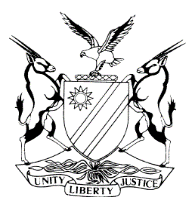REPUBLIC OF NAMIBIA

IN THE HIGH COURT OF NAMIBIA, MAIN DIVISION, WINDHOEK
REVIEW JUDGMENT
Case Title: The State v Simon Learnmore Gonyoro and 3 Others | Case No: CR: 1/2021 | |
High Court MD Review No: 1469/2020 | Division of Court: Main Division | |
Heard before: Judge Claasen et Judge Usiku | Delivered on: 20 January 2021 | |
Neutral citation: S v Gonyoro and 3 others (CR 1/2021) [2021] NAHCMD 3 (20 January 2021) | ||
The order: In respect of all the accused persons, the convictions and sentences are set aside. | ||
Reasons for order: | ||
Claasen J (concurring Usiku J ) 1. This matter was submitted before me for review in terms of s 302(1) of the Criminal Procedure Act 51 of 1977 as amended, (the CPA). 2. Four accused persons appeared before the Rundu Magistrate Court on 16 December 2019. All of them were charged in contravention of s 30(1)(a) of the Immigration Control Act 7 of 1993, i.e. conducting business without a proper work permit. The record of 14 January 2020 indicates that all accused persons pleaded not guilty and the matter was postponed. On the subsequent appearance of 03 June 2020, the prosecutor informed the court of the accused persons’ intention to admit facts in terms of section 220 of the CPA. 3. The accused persons made admissions and the learned magistrate recorded it as admissions in terms of s 220 of the CPA. The state closed its case and all accused persons elected to remain silent when put on their defence. All accused persons were convicted based on the admissions that were recorded. 4. Upon receipt of the record on review, the reviewing court noted some deficiencies and addressed a query to the magistrate. The most pertinent issue was whether the court complied with the legal requirements when it noted formal admissions as advanced by the accused persons. The qualm that the reviewing court noted was that the learned magistrate failed to apply the precautionary measures as to the proper recording of formal admissions by an unrepresented accused. 5. The magistrate in her reply indicated that she was under the impression that s 220 of the CPA does not require a person who is offering an admission to consent to the recording of the same admission and conceded that she did not comply with the principles discussed in S v Daniels1 and in S v Mavundla2. 6. The formalities of recording formal admission was outlined in S v Daniels3. In the said matter it was explained that an accused should be informed that the consequence of making formal admissions in terms of s 220 of the CPA is to relieve the State of the burden of proof and that there is no obligation on him/her to assist the prosecution in proving its case. From the court proceedings it is evident that the learned magistrate did not advance an explanation in this regard to the accused persons, prior to them advancing facts to her, it was not read back to them, nor did she elicit consent from each of the accused persons. Furthermore, the admission by accused 1 reads as follows: ‘I am admitting all the elements of the offence.’ Such a generalised admission is not proper as it does not show that the accused understand and admits to each of the elements contained in the offense. Therefore the convictions and sentences are not in accordance with justice. 7. In the result, I make the following order: In respect of all accused persons, the conviction and sentences are set aside. | ||
C CLAASEN JUDGE | D N USIKU JUDGE | |
1 S v Daniels 1983 (3) 275 (A) page 299 at H.
2 S v Mavundla 1976 (4 SA 731
3 S v Daniels 1983 (3) 275 (A) page 299 at H.
Cited documents 8
Legislation 5
| 1. | Criminal Procedure Act, 1977 | 1919 citations |
| 2. | Labour Act, 2007 | 604 citations |
| 3. | Immigration Control Act, 1993 | 243 citations |
| 4. | Prescription Act, 1969 | 127 citations |
| 5. | Limitation of Legal Proceedings (Provincial and Local Authorities) Act, 1970 | 10 citations |